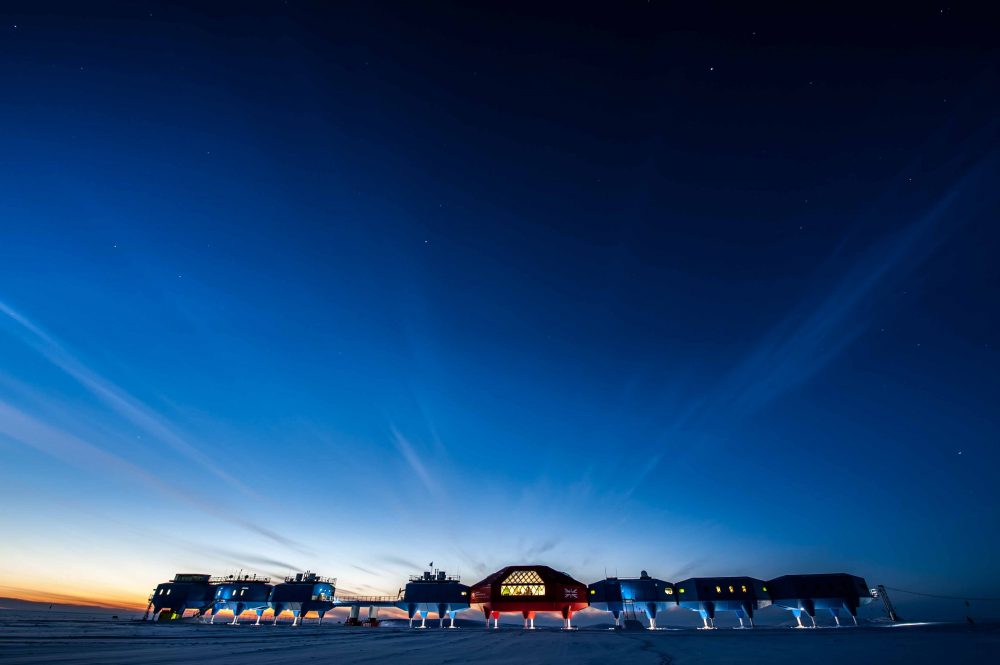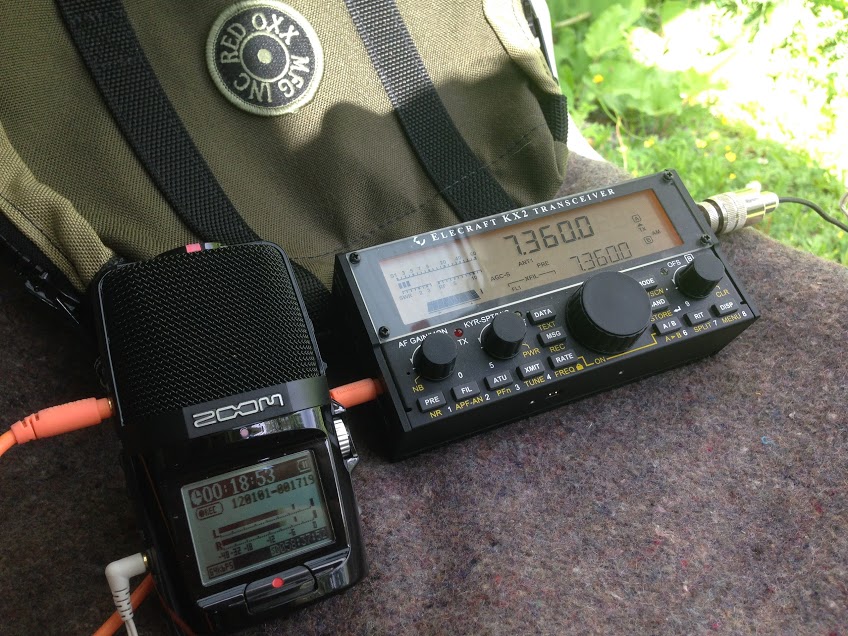Every year, the BBC broadcasts a special program to the scientists and support staff in the British Antarctic Survey Team. The BBC plays music requests and sends special messages to the small team of 40+ located at various Antarctic research stations. Each year, the thirty minute show is guaranteed to be quirky, nostalgic, and certainly a DX-worthy catch!
After successful listener events from years past, I’m once again calling on all SWLing Post readers and shortwave radio listeners to make a short recording (say, 30-60 seconds) of the BBC Antarctic Midwinter Broadcast and share it here at the Post (frequencies and time below).
The recording can be audio-only, or even a video taken from any recording device or smart phone. It would be helpful to have a description and/or photo of your listening environment and location, if possible. Please only submit recordings made from your location–since this is all about how you’re able to receive the broadcast at your location, we would rather not include WebSDR recordings.
Audio should be in the MP3 format and videos either hosted on YouTube or Vimeo so that I can easily embed them without having to convert and upload myself.
If you submit your recording to me, I will post it here on the SWLing Post–and insure that the British Antarctic Survey receives the post, too. The recordings will be arranged by geographic location. Note that due to my schedule this year, it might take a few weeks before I can curate all of the recordings (the process typically takes 8+ hours!).
2020 Midwinter Broadcast Frequencies
The BBC Antarctica winter solstice broadcast will be on June 21, 2020 at 2130-2200 UTC.
Many thanks to SWLing Post contributor, Troy Riedel, who shares the frequencies the BBC plan to use. Note that, in the past, the BBC has sometimes only broadcast on three of the four announced frequencies:
- 5790 kHz Woofferton
- 6170 kHz Ascension
- 7360 kHz Woofferton
- 9580 kHz Ascension
The Midwinter broadcast is one of my favorite programs of the year. I suppose, in part, this is because it happens on June 21–the Summer/Winter solstice–which also happens to be my birthday!
Recording the Midwinter Broadcast has become an SWLing Post community tradition!



Hello,
First-time poster here. This is my one minute recording:
https://youtu.be/ehbYTYGn_5o
Received in Jaslo, south-eastern Poland.
I had no time to set everything properly, so the reception was not so good, but it was fun anyway.
Regards,
Przemek, Poland
Here’s my recording. I could not pick up with my SDR at my location in south central Maine, but I was able to listen in using the webSDR of W3FEF in northeast Pennsylvania. You can see I tried a couple of the frequencies
https://youtu.be/jir0NikCK2Q
Hope this is what you wanted. It was a rather enjoyable broadcast. That you for bringing it to our attention.
73s
Jeb
Hi Thomas, happy bday!
Here is my recording: https://youtu.be/-z-2RMoDH44
Location: Rende (south Italy)
Receiver: xhdata d-808
Antenna: Active mini whip.
Freq: 5790
Hello everyone!
Here 2 my short video of reception, basic setup with Tecsun PL-660 and his longwire indoor.
https://youtu.be/Z9Jy-RLRAR4
https://youtu.be/y_VrvwT5eEc
Location in the South East of ITaly, 40N18E
Time 21.30 UTC
both Wofferton strong signal with best signal at 5790 kHz but with strong local interference.
9580 kHz Ascension very weak signal.
Thank you and Happy Birthday.
Regards, Piero from Salento
Hello everyone!
Here 2 my short video of reception, basic setup with Tecsun PL-660 and his longwire indoor.
https://youtu.be/Z9Jy-RLRAR4
https://youtu.be/y_VrvwT5eEc
Location in the South East of ITaly, 40N18E
Time 21.30 UTC
both Wofferton strong signal with best signal at 5790 kHz but with strong local interference.
9580 kHz Ascension very weak signal.
Thank you and Happy Birthday.
Regards, Piero from Salento
Good morning,
here are two recordings from the city of Brest, in west France.
7360khz:
https://www.youtube.com/watch?v=kjD3SdIVdrU&t=139s
5790khz (sorry for the beginning !)
https://www.youtube.com/watch?v=gvxotohQ2cg
See you in 6 month 🙂
Goodnight.
I send my participation for the special event: Antarctic Midwinter Broadcast 2020
I add a link to the video uploaded to the YouTube portal: https://youtu.be/fk0oc4aVRC8
Also the reception report:
Reception report
Station Name: BBC WORLD SERVICE
English language
Frequency: 11825 khz
Band: 25 Meters
Receiver: Alinco Model DX-R8
Antenna: Long wire + 9: 1 balun
Date and Hours: 21 06 2020 23 30 – 2358 UTC
Listening place: Pachuca, Mexico.
SINPO: 33233
Comments: Interviews, music, greetings addressed to Antarctica, presented by a female voice for listeners of the British research base and that I could listen to in central Mexico.
Martin Herrera
XE1024SWL
Here in Eastern New Jersey (About ten miles from Midtown Manhattan, New York). I received 7360 kHz (Wofferton) & 9580 kHz (Accession Islands) with “good reception frequencies.” 2130 UTC. Unfortunately, 5790 kHZ was a very poor reception. Until, the next frequencies! Will there be a Summer programme?
Happy Birthday Thomas!
Here is my reception of the BBC Antarctic Midwinter Broadcast in full length on YT:
https://youtu.be/fL1ML5lsyjY
Received with Icom IC-R75 and a Wellbrook antenna. Loc: JO40BT. Germany.
Reception was done or tried on 5790 and 7360 kHz from Woofferton (770 km), from Ascension Island on 6170 kHz and 9580 kHz (6857 km).
Ralf
Hello everyone! Ive just listen to this year BBC Antarctic Midwinter broadcast here in Rio Primero, a small rural town in the Cordoba province, central region of Argentina with my Sony ICF-2010 and a 45 meters long random wire antenna with 9:1 balun. Im sending to SWLing.com a brief recording of 7360 via Woofferton, UK and a picture of my shack. Beautiful sunset on a cold winter Father´s day here in Argentina while listening this special transmission. These are the logs for this 2020 Antarctic Midwinter Broadcast:
21/Jun/2020 21:41 6170 Ascension Island, Atlantic Ocean 15321
21/Jun/2020 21:41 7360 Woofferton, United Kingdom 45544
21/Jun/2020 21:41 5790 Woofferton, United Kingdom 45433
21/Jun/2020 21:41 9580 Ascension Island, Atlantic Ocean 25311
73´s to everyone!
Hi, there is a few minutes as received at 23S 46W.
https://youtu.be/XmBYa3NxCbg
regards;
Signal poor in Costa Rica.
Receiver: RFspace Cloud-Iq
Antenna: active mini whip
Couldn’t hear them on 5790 nor on 9580 (Acension would have been a hoot). But I could hear them on 7360 using my homebrew receiver. I am in Northern Viriginia. They were somewhat better on NA5B’s Washington DC Web SDR. But “Aint no mountain high enough” came through clearly on the homebrew receiver. I will try to send a video clip. Bill N2CQR
Hello! Audio recording would be a waste, but, I am hearing them on 9580 in Upper Sideband, with a pre-amp, and about a million dollars worth of equipment! Hi, Hi! 2130 UTC to 2200 UTC with lots of fading. Came just about make out OM, OL, and small child in QSO. Thought I heard, “Dancin in the Moonlight” by Van Morrison. Vertical or horizontal makes no difference. Slightly better win horizontal longwire and antenna tuner. Located here in Detroit, Michigan. United States. Tried my best!!
You sure it’s 21:30 UTC? The site says 21:30 BST which is UTC+1. So that would be 20:30 UTC.
please send me your e mail pls so when i have the recording i ll send it to you ok,
adrian
Hi, Adrian, It’s [email protected]
Hi Thomas,
Here is my 90 second video of the BBC Antartic Mid Winter Broadcast 2020.
Both Wooferton freqs were strong with me, Ascension Island was weak barely readable.
Details of my Rx/Ant are on the youtube video.
Thank you and Happy Birthday.
Regards,
Steven.
Ayrshire, Scotland.